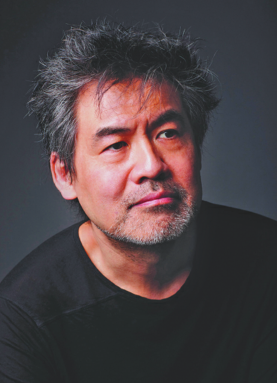Chinese-American playwright David Henry Hwang had been toying with the idea of a theatrical ode to Hong Kong-bred martial arts star Bruce Lee for almost two decades before the debut of his latest work.
 "I've wanted to do a show about Bruce Lee since the mid-1990s. But throughout the 2000s I tried to do it as a musical, and it just wasn't working," Hwang says in an interview with the Signature Theatre.
"I've wanted to do a show about Bruce Lee since the mid-1990s. But throughout the 2000s I tried to do it as a musical, and it just wasn't working," Hwang says in an interview with the Signature Theatre.
"The idea of doing a play that would have musical numbers with martial arts and dance influenced by martial arts seemed exciting to me, and the movement would move the story forward—the way that a song does in a musical."
Hwang's Kung Fu, a portrayal of international icon Bruce Lee's journey from his early years as a child in Hong Kong to his status as a martial arts legend, made its world premiere on Feb 4 at the Signature Theatre in New York.
The production chronicles Lee's life in the United States as he struggles to prove himself as a fighter, a husband, a father and a man.
Hwang admits that Lee's story fits the bill for the traditional immigrant story.
"The play essentially covers his years in the US and his decision to leave and go back to Hong Kong," Hwang says. "I am focusing on the years in which he was dealing most with culture clash—what it means to be an American and what he is able to achieve, as well as the limitations."
Hwang is a Residency One Playwright with Signature, which means the theater company devotes a full season to Hwang's work in an effort to give audiences an in-depth view of a living playwright's body of work by revisiting and premiering a series of plays.
For his residency, Hwang organized the nonprofit off-Broadway company's inaugural Contemporary Chinese Playwriting Series, which has connected four Chinese playwrights with US-based artists to develop and present English-language versions of their work.
The CCPS is aimed at introducing US audiences to the diverse world of contemporary Chinese playwriting, as well as fostering a conversation between Chinese and US artists.
Best known for his appearances on Broadway and his 1988 Tony Award-winning play M. Butterfly, Hwang often touches on issues of cultural identity and socioeconomic standing. His comedy Chinglish made its way to Broadway in 2011 after debuting at the Goodman Theatre in Chicago.
Hwang's Golden Child, a 1996 play about a 20th-century Chinese family facing Westernization, was the first work tapped for his residency with Signature.
The Dance and the Railroad, which documents the struggles of two Chinese railroad workers in the US during an 1867 labor strike, was the second play of Hwang's trio with Signature.
Though it is one of the playwright's earlier works, Hwang says The Dance and the Railroad "incorporates the idea of movement and dance into a play".
"Even back when I was 23 years old, I was playing with this idea of how you could combine martial arts movement within a Western dramatic structure," Hwang adds.
At the end of the day, Kung Fu is able to achieve an important goal for any successful theatrical production: characters who have real depth.
Hwang, who was born and grew up in Los Angeles, says he "can't help but feel motivated" by the "one- and two-dimensional" depictions of Asian characters that he saw on television in his youth.
In blending dance, Chinese opera, martial arts and drama into an unfamiliar, yet intriguing theatrical medium, Hwang has managed to find an apt form for his portrayal of Bruce Lee.
"A lot of my career has been about trying to create three-dimensional characters and imbue these characters with as much humanity as I can, including an iconic figure like Bruce Lee," Hwang says. "Bruce Lee was a huge figure in the popularization of martial arts in the US, but we don't really have an image of him as a human being."
"It's a relatively new sort of form, but it seems appropriate to tell the story of someone like Bruce Lee—so much of what he achieved was physical, yet that wasn't all he achieved," Hwang adds. "I hope Kung Fu ends up being a three-dimensional portrait that introduces us to a lot of the challenges he faced and helps us explore Bruce Lee the man."
We recommend:
